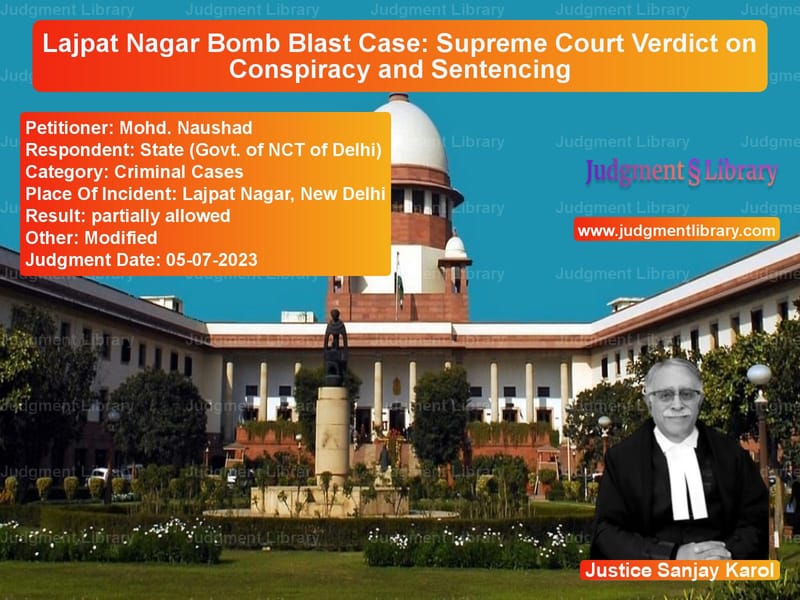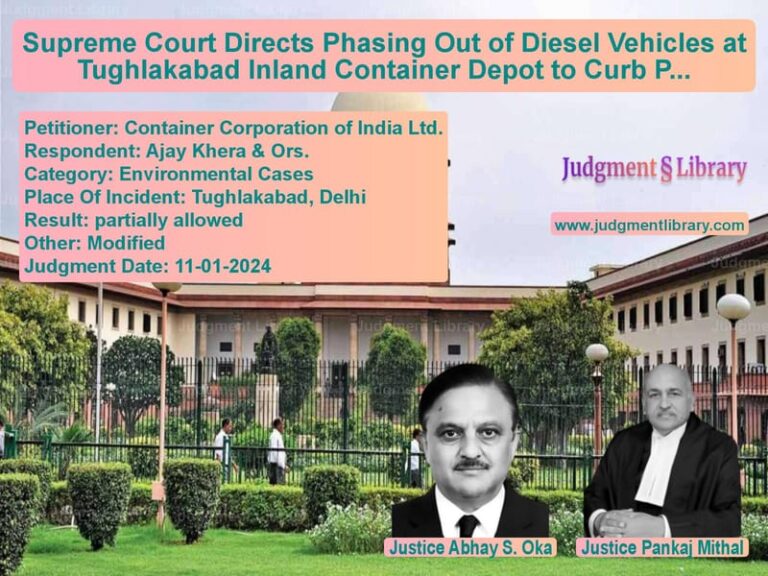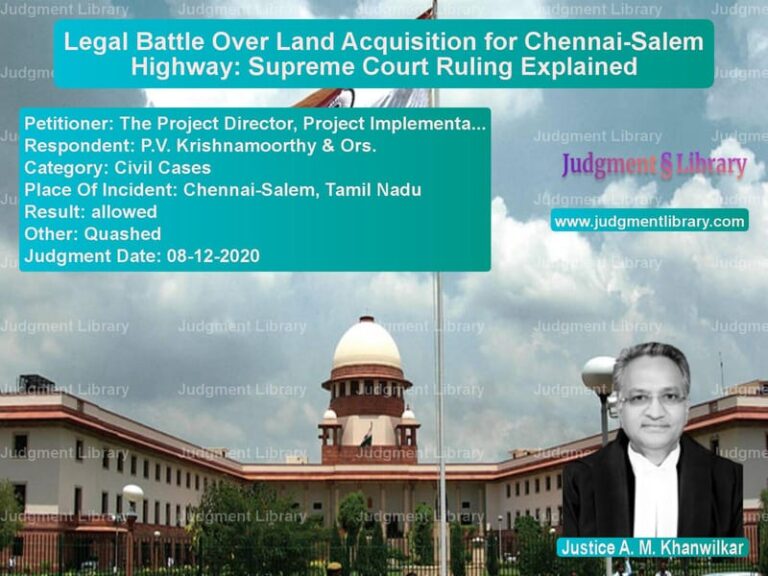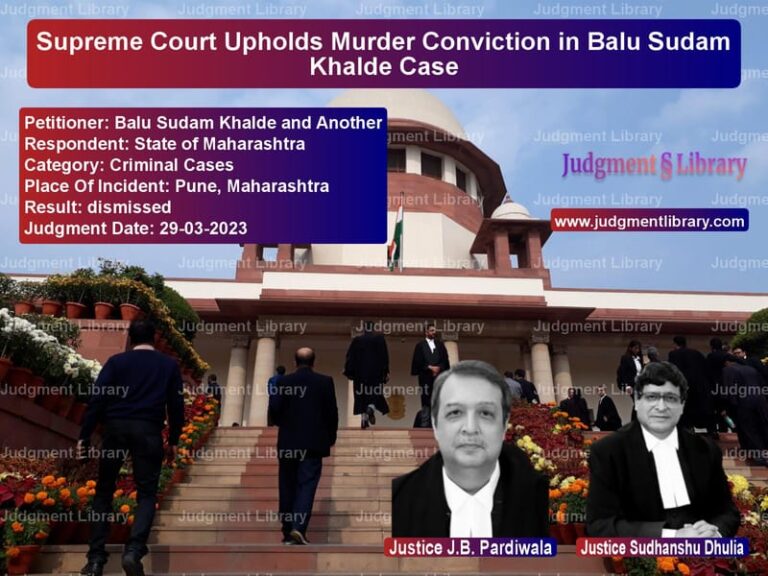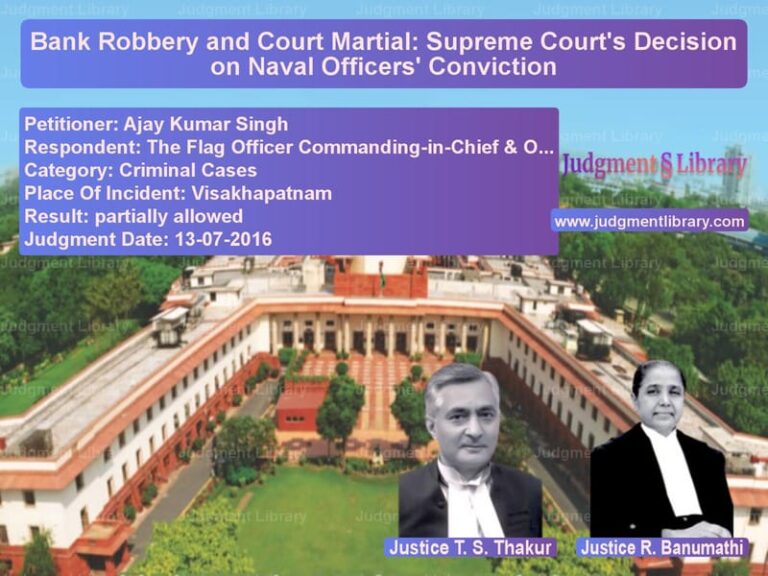Lajpat Nagar Bomb Blast Case: Supreme Court Verdict on Conspiracy and Sentencing
The case of Mohd. Naushad v. State (Govt. of NCT of Delhi) is a significant ruling concerning the 1996 Lajpat Nagar bomb blast, which resulted in the deaths of 13 individuals and injuries to 38 others. This case involved multiple accused charged under serious provisions of the Indian Penal Code (IPC), the Explosive Substances Act, and the Unlawful Activities (Prevention) Act.
The Supreme Court revisited the convictions and sentences awarded to the accused, addressing key legal issues surrounding confessions, conspiracy charges, and the reliability of witness testimony. In its final verdict, the Court partially allowed the appeals, modifying the sentence of some convicts while upholding their convictions.
Background of the Case
The case originated with FIR No. 517 of 1996, registered at the Lajpat Nagar Police Station, New Delhi. The prosecution alleged that a group of 17 individuals was responsible for orchestrating the blast, with the intention of creating terror and destabilizing the nation.
Several of the accused were arrested, while others remained absconding. The trial continued for years, involving testimonies from multiple witnesses, forensic evidence, and judicial confessions.
Charges and Legal Provisions Invoked
The accused were charged under various sections of the Indian Penal Code (IPC), including:
- Section 302 IPC – Punishment for murder
- Section 120B IPC – Criminal conspiracy
- Section 307 IPC – Attempt to murder
- Explosive Substances Act – Possession and use of explosives
- Unlawful Activities (Prevention) Act – Engaging in activities against national security
Arguments by the Petitioner
The petitioner, representing the convicted individuals, presented the following arguments:
- The case relied heavily on circumstantial evidence, which was insufficient to prove guilt beyond a reasonable doubt.
- The prosecution failed to establish direct involvement of the accused in planting or executing the bomb blast.
- The alleged judicial confession by one of the accused (A9 – Javed Ahmed Khan) could not be used as substantive evidence against co-accused individuals.
- Several prosecution witnesses either turned hostile or provided inconsistent statements, weakening the prosecution’s case.
- The prosecution exaggerated the accused’s role in the conspiracy without providing concrete evidence of their involvement.
Arguments by the Respondent
The prosecution countered the petitioner’s arguments, stating:
- The prosecution had successfully established a direct chain of events linking the accused to the crime.
- The confession of A9 was voluntary and corroborated by independent pieces of evidence, including forensic reports and call records.
- The accused were involved in planning the attack by procuring explosives, identifying the target location, and executing the attack.
- Judicial precedents allowed reliance on circumstantial evidence if it formed a coherent and unbroken chain leading to the guilt of the accused.
Key Findings of the Supreme Court
The Supreme Court meticulously analyzed the available evidence and legal arguments before delivering its verdict. The following were its key observations:
1. Admissibility of Confessions
“The confessional statement made by A9 (Javed Ahmed Khan) was legally admissible and provided substantial evidence linking the other accused to the conspiracy.”
The Court upheld the validity of judicial confessions, noting that they were made voluntarily and in accordance with legal procedures.
2. Establishment of Criminal Conspiracy
“The prosecution successfully demonstrated that the accused were part of a larger conspiracy with the objective of carrying out terrorist activities.”
The Court ruled that circumstantial evidence, combined with confessions and forensic findings, sufficiently established the accused’s involvement.
3. Reliability of Witness Testimony
“While some witnesses turned hostile, the testimonies of key prosecution witnesses were credible and formed a cohesive account of the events.”
The Court rejected the argument that hostile witnesses alone should lead to acquittal, as other evidence corroborated the prosecution’s case.
Final Judgment and Sentencing
After reviewing the evidence, the Supreme Court delivered the following verdict:
- A3 (Mohd. Naushad) – Conviction upheld, but death sentence commuted to life imprisonment.
- A9 (Javed Ahmed Khan) – Conviction upheld, sentenced to life imprisonment.
- A5 and A6 – Acquitted due to lack of sufficient evidence linking them to the crime.
Impact of the Judgment
This ruling holds significant implications for criminal law, particularly in cases involving terrorism and conspiracy:
- Clarifies the role of confessions – The judgment establishes the conditions under which judicial confessions can be used against co-accused.
- Strengthens the prosecution of terror cases – Circumstantial evidence, if forming a clear and continuous chain, can be relied upon to convict individuals involved in conspiracies.
- Ensures fair sentencing – The Supreme Court balanced the severity of the crime with the individual culpability of each accused.
Conclusion
The Supreme Court’s decision in Mohd. Naushad v. State (Govt. of NCT of Delhi) reinforces the importance of fair trials in terrorism cases. By upholding convictions where evidence was strong and modifying sentences where appropriate, the Court ensured justice was served while upholding legal principles. This ruling sets an important precedent for future cases involving criminal conspiracy and acts of terrorism.
Petitioner Name: Mohd. Naushad.Respondent Name: State (Govt. of NCT of Delhi).Judgment By: Justice Sanjay Karol.Place Of Incident: Lajpat Nagar, New Delhi.Judgment Date: 05-07-2023.
Don’t miss out on the full details! Download the complete judgment in PDF format below and gain valuable insights instantly!
Download Judgment: mohd.-naushad-vs-state-(govt.-of-nct-supreme-court-of-india-judgment-dated-05-07-2023.pdf
Directly Download Judgment: Directly download this Judgment
See all petitions in Terrorist Activities
See all petitions in Attempt to Murder Cases
See all petitions in Custodial Deaths and Police Misconduct
See all petitions in Extortion and Blackmail
See all petitions in Judgment by Sanjay Karol
See all petitions in partially allowed
See all petitions in Modified
See all petitions in supreme court of India judgments July 2023
See all petitions in 2023 judgments
See all posts in Criminal Cases Category
See all allowed petitions in Criminal Cases Category
See all Dismissed petitions in Criminal Cases Category
See all partially allowed petitions in Criminal Cases Category

